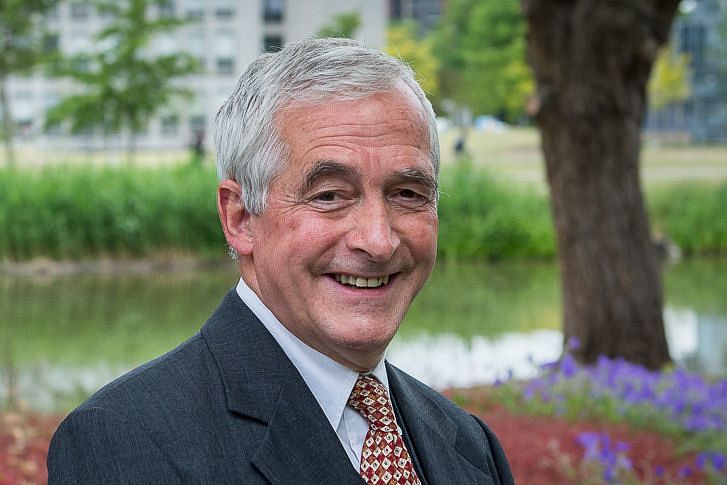In the previous edition of Delta, Professor Caspar Chorus raised the alarm regarding work pressure and the danger of burnouts at TU Delft. Rector Magnificus Karel Luyben responds: “It is alright to say no.”
It took a great deal of courage for Caspar Chorus to submit his article about his burnout. His colleagues knew his story, as did we, the Executive Board. Making his story public is an indication of just how pressing he believes this problem to be. And he is right.
I recognise many aspects of his story. As a university, we continue to score poorly when it comes to work pressure, as do other universities. Why is that? This can partly be explained by what we are: an academy. Academic freedom equates to unbridled possibilities, and that attracts ambitious people who want to shoot for the stars. And universities create the necessary scope for this. But there are also a lot of requirements. Allow me to make a quick calculation. About 12 years ago, we had 12,000 students. We now have 22,000. The government contribution, save indexation, has remained roughly unchanged – despite the clear messages we repeatedly send on the subject. We are therefore attending to the needs of considerably more students with approximately the same number of staff.
So, what can we do to limit the burden of work? Lowering the quality of education is not up for discussion for anyone at TU Delft. In the more than 25 years that I have been in the profession, education has remained sacred to me, and I know that the same applies for many at TU Delft. You might then say that less research is the way forward, but that is also not an option that our researchers are keen on. Which is why they often compensate by putting in longer hours. And it is also worth noting that the chances of successfully securing subsidies have dropped considerably. As a result, academics submit even more time-consuming applications, which only serves to further increase work pressure. People sometimes also drop out, or leave the university because they can no longer see the way forward. Or worse, as Caspar Chorus described. Of course, that cannot be allowed to happen.
Culture of meetings
That is why this subject is one of our main priorities. We recently distributed the TU Delft Employee Survey to all staff throughout the university in order to precisely chart the current situation regarding how people think about their work and work-related stress. The results are currently being collated, and based on the findings, we will take targeted measures to limit the risks caused by work stress as much as possible. Of course, these activities will take place in close collaboration with the employee participation organisations.
Caspar Chorus proposes ways of achieving these objectives, and broadly speaking, I agree with his ideas. Take the culture of meetings, for example. As a member of the Executive Board, I cannot really avoid them, but I can imagine that they could be cut back a bit elsewhere in the organisation. After all, nowadays, are there not so many other ways to inform and involve each other without physically pulling up a chair in a meeting room? That is something that we at TU Delft should know more than anybody else.
Top-level sport metaphor
Finally doing away with the top-level sport metaphor could indeed also help. If science can be compared to sport at all, it would particularly be to recreational sport. You see, the contributions of science to society go much further than just striving for medals or trophies, and the team effort is at least as important as who scores the winning goal.
So, enough about sport. I would like to add a small qualification to Caspar Chorus’ recommendations regarding institutes. We set up the institutes precisely so that it is easier for researchers to come into contact with each other. They are designed to improve collaboration, not only internally, but also externally through improved visibility. This should ultimately improve efficiency and also, for example, increase the success rate of subsidy applications for major, multidisciplinary projects. Institutes are here to help, not to create extra pressure.
If that turns out not to be the case in practice, it is certainly an issue that will be addressed during the periodic evaluation at such an institute. After all, nobody has time for paper tigers or unnecessary meetings. I can also imagine that, with their unique expertise, researchers from the Faculty of Technology, Policy and Management (TPM) in particular are frequently and enthusiastically invited to play a role within these institutes – perhaps over-invited is the correct term. In that case, the solution proposed by Caspar Chorus naturally fits the bill: say ‘no’ once in a while.
Cultural shift
I believe that what Caspar Chorus primarily wants to achieve is a cultural shift. Together, we can change the culture that we have jointly created. Let’s give each other space to focus on what we are good at, and less on marginal issues. Let’s discuss quality, not quantity. And, above all, let’s not shut our eyes to signs that a colleague is at the end of his or her tether, because we also need to take care of each other in our organisation.
I am perhaps not the best example. It is common knowledge that I can get by with little sleep, which means that there are many potential working hours in a day. However, that does not mean that I expect the same from others. It is important that we are aware of our limits, that we indicate what they are, and that we respect each other’s limits. I would like to close with my own appeal: it is alright to say ‘no’, even to your Rector Magnificus.
This is a translation of the original Dutch version.



Comments are closed.